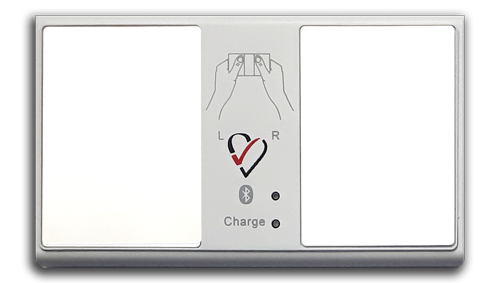Learn More About Electrocardiograms (EKG/ECG):
EKG Tests
Are you interested in receiving accurate electrocardiogram (‘ECG’ or ‘EKG’) readings in as few as 30 seconds that can then be sent instantly to a physician for review?
Common EKG Tests
Resting ECG
Purpose: This is the most common type of ECG, and it’s performed while the patient is at rest. It helps assess the heart’s electrical activity under normal conditions.
Importance: It is used for routine screening, detecting arrhythmias, identifying conduction abnormalities, and assessing overall heart health.
Exercise (Stress) ECG or Stress Test
Purpose: This test is performed while the patient is exercising on a treadmill or stationary bike. It helps evaluate how the heart responds to stress and can reveal abnormalities that may not be evident at rest.
Importance: Stress tests are crucial for diagnosing coronary artery disease, evaluating exercise tolerance, and identifying abnormal heart rhythms during physical activity.
Holter Monitoring
Purpose: A Holter monitor is a portable device that records the heart’s electrical activity continuously over 24 to 48 hours (or longer). It’s worn by the patient during their daily activities.
Importance: Holter monitoring is used to detect intermittent arrhythmias, assess the effectiveness of anti-arrhythmic medications, and evaluate symptoms like palpitations that may not occur during a short-term ECG.
Event Monitoring
Purpose: Similar to Holter monitoring, an event monitor is a portable device that the patient activates when they experience symptoms. It records the heart’s electrical activity during specific events.
Importance: Event monitoring is useful for capturing infrequent symptoms, such as irregular heartbeats or palpitations, that may not be present during a standard ECG.
Ambulatory ECG Monitoring (Ambulatory ECG or Ambulatory Monitoring)
Purpose: This involves wearing a portable ECG device for an extended period, typically 24 hours or more. It’s useful for monitoring heart activity over an extended timeframe.
Importance: Ambulatory ECG monitoring helps detect intermittent arrhythmias, assess the effectiveness of treatment, and provide a more comprehensive understanding of the heart’s electrical activity in everyday life.
These various EKG tests play a crucial role in diagnosing and managing a range of cardiac conditions. They provide valuable information to healthcare professionals, enabling them to make informed decisions about treatment and intervention strategies. Regular EKG testing is particularly important for individuals with known risk factors for heart disease or those experiencing symptoms such as chest pain, palpitations, or shortness of breath.
This website offers general ECG information for educational purposes only. We are not licensed medical professionals. Content should not be construed as a substitute for professional medical advice, diagnosis, or treatment. For personalized guidance, consult a qualified healthcare provider.
Learn All About EKGs
Use these pages to get up to speed on the history of electrocardiograms, their purpose, and the future of telemedicine.
About EKGs
An electrocardiogram (ECG or EKG) is a non-invasive medical test that’s crucial in the field of cardiology for assessing the electrical activity of the heart. EKGs are an essential tool for diagnosing and monitoring various heart conditions, and its history, principles, and applications are subjects of great significance in the medical world.
Abnormal EKGs
An abnormal EKG (electrocardiogram), also known as an ECG, refers to a recording of the heart's electrical activity that deviates from the expected or typical patterns. EKGs are used to assess the heart's rhythm and detect various cardiac conditions. Abnormalities on an EKG can indicate a range of heart-related problems, and the specific abnormalities may vary.
EKG Tests
Electrocardiogram (ECG or EKG) tests come in various forms, each serving a specific purpose in assessing the electrical activity of the heart. These tests are important for diagnosing various heart conditions and evaluating the overall health of the cardiovascular system. With recent advancements, ECG Tests can now be performed at home or a hospital.
Heart Rate Monitors
The basic components of a heart monitor include electrodes, which are placed on the skin to detect electrical signals generated by the heart, and a recording or monitoring unit that processes and displays the data. The recorded information helps healthcare providers assess the heart’s health, diagnose conditions, and tailor treatment plans accordingly.
Telemedicine
Mobile ECG devices play a pivotal role in telemetry and burgeoning field of telemedicine. These devices allow patients to record medical-grade EKGs at home and then send to a doctor for physician review. This convenience saves time, costs and can mean the difference in detecting and treating cardiac conditions that require immediate attention.
HeartCheck Products
Receive accurate electrocardiogram (‘ECG’ or ‘EKG’) readings in as few as 30 seconds that can then be sent instantly to a physician for review. Health Canada and FDA cleared, the HeartCheck™ CardiBeat ECG monitor is a medical-grade, handheld device that’s easy to use for consumers and available for purchase over the counter.

